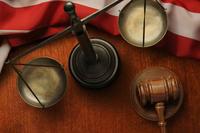
We posted a story over at Military.com this morning based on an interview your favorite DT poster, Ward Carroll, conducted with Sen. John McCain yesterday afternoon. Id recommend giving the story a read and listening to the interview, which we posted as a Podcast last night.
McCain is fighting an uphill battle in his quest for the Republican presidential nomination, championing a war the general public is sick of talking about. The fact that a man who was a prisoner of war in Vietnam for five and a half years told us hes as convinced the U.S. is winning in Iraq "as anything I have been convinced of in my life" is saying something. His campaign may have lost its "straight talk express" luster among the political media and pundits, but hes still a remarkable man with firm convictions.
Heres Wards editorial on the McCain story...
I had a chance to chat with Senator John McCain yesterday as part of my weekly "The Editor's Desk" podcast at Military.com. Check it out here.
Regardless of your politics, you should be aware of (if not respectful of) what this man has done in his life. Never mind what he's accomplished as a lawmaker. His career as a naval aviator is more impressive, in my book. Few know that he was aboard the USS Forrestal (CV 59) when a Zuni rocket inadvertantly fired across the flightdeck, setting off a massive fire that killed scores of men and destroyed dozens of aircraft. Here's the video:
McCain was in the cockpit of an A-4 waiting to launch, parked on the port side aft,
right next to the A-4 that. His jet was hit by the rocket. Once he realized how bad the situation was, heejected out of his burning jet and parachuted into the water behind the carrierescaped by climbing out of the cockpit, walking down the nose and jumping off the refueling probe.Some months later his jet was hit by a SAM over Hanoi during a bombing run.
Againhe ejected, this time at high speed. The wind blast broke both arms and his right leg. He landed in a lake in the middle of Hanoi, unconscious. He came to and fought to get to the surface but sank again. He finally located his lift preserver and floated to the top of the lake only to be greeted by an enraged mob. Soldiers had to intervene to keep him from being killed by the locals.McCain was taken to Hoa Lo prison and immediately worked over for information by his captors. Soon the Vietnamese found out he was a four-star admiral's son, so they nursed him to health and took him to "the Plantation" for propaganda purposes. He spent two years in solitary.
When McCain's father took the CINCPAC job, the Vietnamese tried to get him to accept early release. In spite of his health and frequent torture sessions, he refused.
Here's an except from Honor Bound (USNI Press), a wonderful book about American POWs in Vietnam:
"Cat [one of the guards] made the PW pay for denying them their coup, singling him out for what was probably the harshest sustained persecution of any prisoner at the Plantation, lasting over a year, including an episode in September 1968 when over a span of four days his left arm was rebroken, he was trussed in ropes, and he was beaten 'every two to three hours' until he signed a confession of criminal wrongdoing and apology.
"That statement was about all they got out of the 'crown prince.' He fended off pressure to meet with the delegations. He diverted interrogators with useless information, once listing the offensive line of the Green Bay Packers as the members of his squadron."
Too often the political spectacle in this country blurs what great men did during their time in uniform. Remember the late, great Medal of Honor winner James B. Stockdale's 15 minutes in the political spotlight? Here's a reminder:
I got to know Admiral Stockdale in the early '90s when I was a Navy lieutenant working as the editor of Approach magazine (and flying with the aggressor squadron at NAS Oceana - not a bad gig). Not only had Stockdale proved himself as the senior ranking officer during seven years in the crucible of a Hanoi prison, once he was repatriated he dedicated himself to the life of the mind. In the final decade-plus of his life he was as close to a true, credible philosopher as this nation has ever produced.(Check out his book Thoughts of a Philosophical Fighter Pilot for proof of this.) So how is it that this man is perceived by the American public for even a second as other than the hero he is? And what is it about the campaign process that we've allowed ourselves to be co-opted by those who, say, think nothing of a $1,000 haircut?
The bottom line: Success in politics has little to do with demonstrated character, and we seldom demand demonstrated character from our politicians. What does that say about us?
-- Christian






